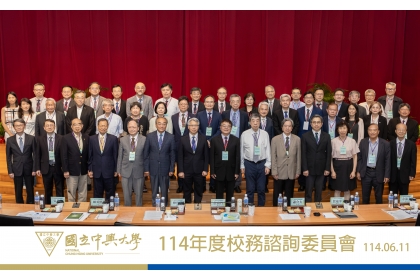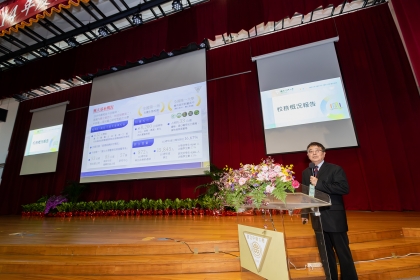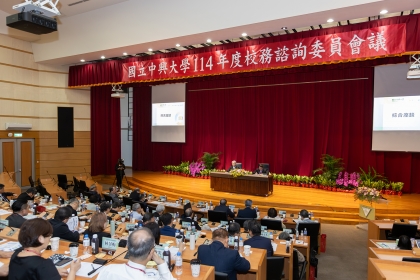NCHU Holds University Advisory Committee Meeting, Gathers Insights from Industry, Government, and Academia to Advance Institutional Development
2025-06-16
興新聞張貼者
Unit秘書室
210
On June 11, National Chung Hsing University (NCHU) convened its University Advisory Committee, chaired by Dr. James C. Liao, President of Academia Sinica. The meeting brought together 22 distinguished figures from industry, government, and academia to provide strategic insights into the university’s continued growth. Many members commended NCHU’s recent institutional achievements and offered forward-looking recommendations related to the development of new campuses, expansion of external funding sources, the strategic positioning of the university hospital, succession planning in key academic fields, and faculty recruitment.
During the morning session, President Fuh-Jyh Jan, along with three vice presidents, presented updates on the university’s overall operations, international priority areas, featured research centers, and the development plans for the Nantou Branch and Fuxing Campus. Additional presentations by senior administrators covered NCHU’s progress in educational innovation, social responsibility, industry-academia partnerships, public accessibility of higher education, and the university’s international administrative support systems.
In the afternoon, committee members toured three of NCHU’s flagship interdisciplinary research hubs: the Advanced Research Center for Humanities and Social Sciences, the i-Center for Advanced Science and Technology, and the Biotechnology Center. The visit provided a first-hand look at the university’s efforts to integrate research excellence with societal impact.
The meeting was attended by an exceptional group of academic and industry leaders. In addition to Dr. Liao, participants included Academicians Hsiang-Tsung Kung, Su-May Yu, Tuan-hua Ho, Ming-Che Shih, Maw-Kuen Wu, Lih-Juann Chen, and Li-Chyong Lin; former NCHU President Jei-Fu Shaw; former Judicial Yuan President In-Jaw Lai; Fan-sen Wang, Chair of the Taiwan Comprehensive University System; Hsin-Huang Michael Hsiao, Senior Advisor to the Executive Yuan; Hung-Yin Tsai, President of NARLabs; Jen-Leih Wu, Visiting Chair Professor at Academia Sinica; Chiu-Chung Young, Academician; Huey-Kang Sytwu, President of NHRI; Wen-Chen Tu, Deputy Minister of Agriculture; Wei-Chi Tsai, Vice President of National Chengchi University; Chien-Liang Lee and Chung-li Wu, directors at Academia Sinica’s Law and Political Science Institutes, respectively; as well as industry leaders Miin Wu, Chairman of Macronix International Co., LTD., and Te-Hua Yang, Chairman of TTGroup.
President Jan highlighted NCHU’s pioneering role in establishing advisory councils among Taiwanese universities, a practice it initiated in 2005. He expressed deep appreciation to Dr. Liao for his ongoing leadership of the committee since 2017. This year marked Jan’s first time chairing the committee as president, although he had previously been actively involved during his terms as Dean of the College of Agriculture and Natural Resources and as Vice President. He noted that many past committee suggestions had been implemented as policy, including reducing teaching hours for pregnant faculty within his first three months in office, securing Ministry of Health and Welfare funding to establish a nursery for children aged 0 to 2, reforming credit recognition rules for double majors and repeated courses, and initiating plans to establish a new Department of Aquaculture. Looking ahead, Jan emphasized the university’s commitment to attracting external resources and crafting strategic initiatives that enhance NCHU’s social impact and international standing in higher education.
Dr. James C. Liao stated that a university’s core mission lies in knowledge creation, talent cultivation, and societal contribution. Each institution must define its strengths and priorities based on these foundations. He stressed that education should go beyond classroom knowledge, fostering students’ problem-solving capabilities—especially in addressing Taiwan’s pressing issues. Universities should therefore align their resource allocation and evaluation systems with their development goals to avoid bureaucratic formality. He encouraged NCHU to make full use of this meeting and harness the collective wisdom of the committee to elevate the university's development.
Key recommendations proposed by the committee included:
1. New Campus Development: While the Nantou Branch has received NT$4 billion from the National Development Council, future development costs will likely exceed this budget. The university is encouraged to seek corporate partnerships and introduce industry resources, as well as establish financial assessment mechanisms for the new campus.
2. External Resource Acquisition: NCHU currently relies heavily on funding from the Ministry of Education, NSTC, and the Ministry of Agriculture. It was suggested that the university form interdisciplinary teams to pursue resources from other agencies such as the Ministry of Economic Affairs and Ministry of Health and Welfare.
3. University Hospital Development: With the medical college's research strengths, NCHU can enhance its hospital's clinical capabilities. By leveraging its expertise in agriculture and animal science and aligning with the needs of a super-aged society, the university is advised to focus on active aging, preventive medicine, and AI healthcare, rather than aiming for large-scale hospital expansion.
4. Sustaining Key Academic Fields: As the principal investigators of several featured research centers under the Higher Education Sprout Project near retirement age, the university should prioritize recruiting outstanding young talent to ensure knowledge transfer and long-term planning.
5. Fundamental Science Talent: NCHU’s pioneering efforts in nanotechnology over 20 years ago have evolved into today's i-Center for Advanced Science and Technology, with excellent results. Faculty members have successfully transitioned from basic science to applied research. The university should continue attracting international talent and promote fundamental and interdisciplinary research.
6. Bilingual and EMI Strategy: The university should clarify whether its English-medium instruction aims to serve international students or to enhance English proficiency among local students. It was recommended to expand Mandarin language courses to better support foreign students who intend to remain in Taiwan.
7. Impact of AI on Teaching: Establish AI faculty development communities to explore how AI tools can enhance learning outcomes and teaching effectiveness.
8. Admissions Strategy: Emphasize NCHU’s strengths in SDGs, AI applications, carbon reduction, and industrial engagement to attract top high school students.
9. Mental Health Support: Strengthen recruitment and retention of psychological counselors to meet the needs of both local and international students, as well as faculty and staff.
During the morning session, President Fuh-Jyh Jan, along with three vice presidents, presented updates on the university’s overall operations, international priority areas, featured research centers, and the development plans for the Nantou Branch and Fuxing Campus. Additional presentations by senior administrators covered NCHU’s progress in educational innovation, social responsibility, industry-academia partnerships, public accessibility of higher education, and the university’s international administrative support systems.
In the afternoon, committee members toured three of NCHU’s flagship interdisciplinary research hubs: the Advanced Research Center for Humanities and Social Sciences, the i-Center for Advanced Science and Technology, and the Biotechnology Center. The visit provided a first-hand look at the university’s efforts to integrate research excellence with societal impact.
The meeting was attended by an exceptional group of academic and industry leaders. In addition to Dr. Liao, participants included Academicians Hsiang-Tsung Kung, Su-May Yu, Tuan-hua Ho, Ming-Che Shih, Maw-Kuen Wu, Lih-Juann Chen, and Li-Chyong Lin; former NCHU President Jei-Fu Shaw; former Judicial Yuan President In-Jaw Lai; Fan-sen Wang, Chair of the Taiwan Comprehensive University System; Hsin-Huang Michael Hsiao, Senior Advisor to the Executive Yuan; Hung-Yin Tsai, President of NARLabs; Jen-Leih Wu, Visiting Chair Professor at Academia Sinica; Chiu-Chung Young, Academician; Huey-Kang Sytwu, President of NHRI; Wen-Chen Tu, Deputy Minister of Agriculture; Wei-Chi Tsai, Vice President of National Chengchi University; Chien-Liang Lee and Chung-li Wu, directors at Academia Sinica’s Law and Political Science Institutes, respectively; as well as industry leaders Miin Wu, Chairman of Macronix International Co., LTD., and Te-Hua Yang, Chairman of TTGroup.
President Jan highlighted NCHU’s pioneering role in establishing advisory councils among Taiwanese universities, a practice it initiated in 2005. He expressed deep appreciation to Dr. Liao for his ongoing leadership of the committee since 2017. This year marked Jan’s first time chairing the committee as president, although he had previously been actively involved during his terms as Dean of the College of Agriculture and Natural Resources and as Vice President. He noted that many past committee suggestions had been implemented as policy, including reducing teaching hours for pregnant faculty within his first three months in office, securing Ministry of Health and Welfare funding to establish a nursery for children aged 0 to 2, reforming credit recognition rules for double majors and repeated courses, and initiating plans to establish a new Department of Aquaculture. Looking ahead, Jan emphasized the university’s commitment to attracting external resources and crafting strategic initiatives that enhance NCHU’s social impact and international standing in higher education.
Dr. James C. Liao stated that a university’s core mission lies in knowledge creation, talent cultivation, and societal contribution. Each institution must define its strengths and priorities based on these foundations. He stressed that education should go beyond classroom knowledge, fostering students’ problem-solving capabilities—especially in addressing Taiwan’s pressing issues. Universities should therefore align their resource allocation and evaluation systems with their development goals to avoid bureaucratic formality. He encouraged NCHU to make full use of this meeting and harness the collective wisdom of the committee to elevate the university's development.
Key recommendations proposed by the committee included:
1. New Campus Development: While the Nantou Branch has received NT$4 billion from the National Development Council, future development costs will likely exceed this budget. The university is encouraged to seek corporate partnerships and introduce industry resources, as well as establish financial assessment mechanisms for the new campus.
2. External Resource Acquisition: NCHU currently relies heavily on funding from the Ministry of Education, NSTC, and the Ministry of Agriculture. It was suggested that the university form interdisciplinary teams to pursue resources from other agencies such as the Ministry of Economic Affairs and Ministry of Health and Welfare.
3. University Hospital Development: With the medical college's research strengths, NCHU can enhance its hospital's clinical capabilities. By leveraging its expertise in agriculture and animal science and aligning with the needs of a super-aged society, the university is advised to focus on active aging, preventive medicine, and AI healthcare, rather than aiming for large-scale hospital expansion.
4. Sustaining Key Academic Fields: As the principal investigators of several featured research centers under the Higher Education Sprout Project near retirement age, the university should prioritize recruiting outstanding young talent to ensure knowledge transfer and long-term planning.
5. Fundamental Science Talent: NCHU’s pioneering efforts in nanotechnology over 20 years ago have evolved into today's i-Center for Advanced Science and Technology, with excellent results. Faculty members have successfully transitioned from basic science to applied research. The university should continue attracting international talent and promote fundamental and interdisciplinary research.
6. Bilingual and EMI Strategy: The university should clarify whether its English-medium instruction aims to serve international students or to enhance English proficiency among local students. It was recommended to expand Mandarin language courses to better support foreign students who intend to remain in Taiwan.
7. Impact of AI on Teaching: Establish AI faculty development communities to explore how AI tools can enhance learning outcomes and teaching effectiveness.
8. Admissions Strategy: Emphasize NCHU’s strengths in SDGs, AI applications, carbon reduction, and industrial engagement to attract top high school students.
9. Mental Health Support: Strengthen recruitment and retention of psychological counselors to meet the needs of both local and international students, as well as faculty and staff.




